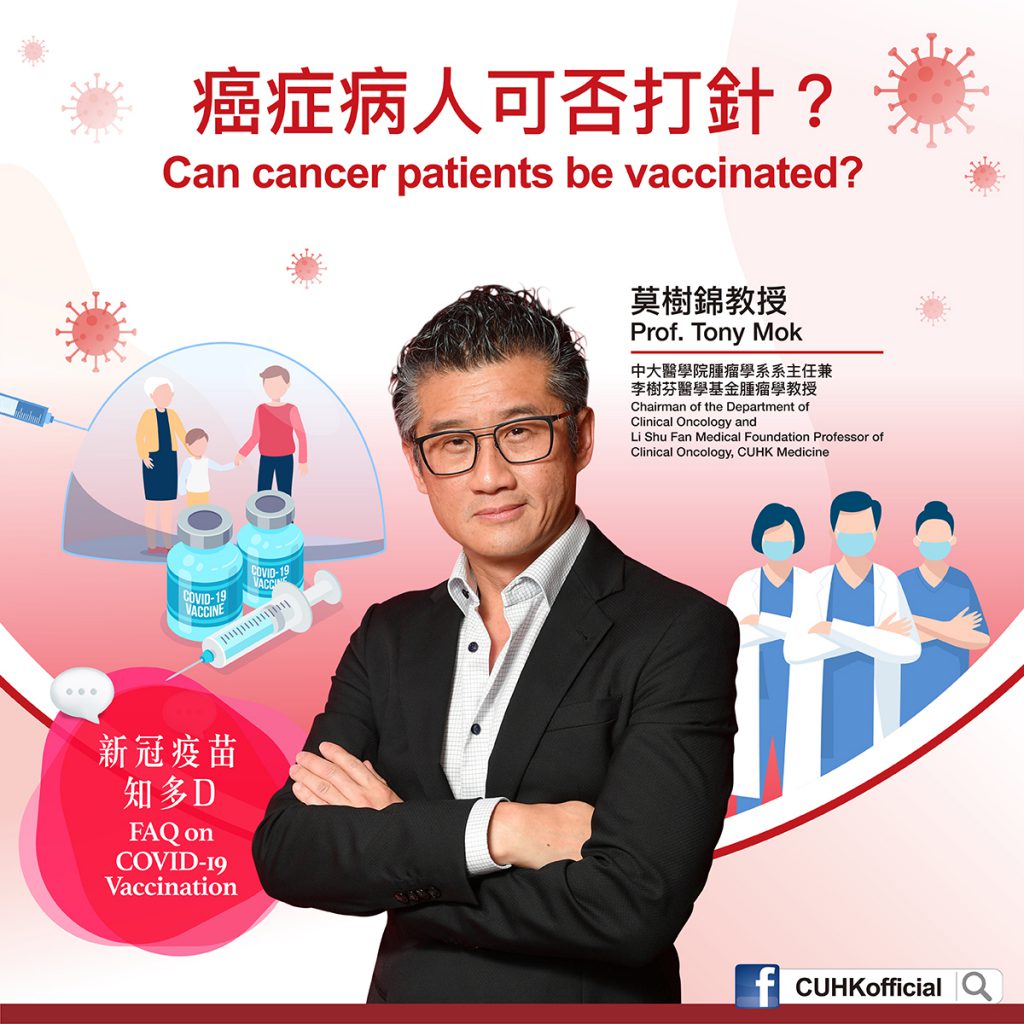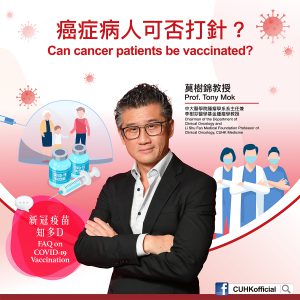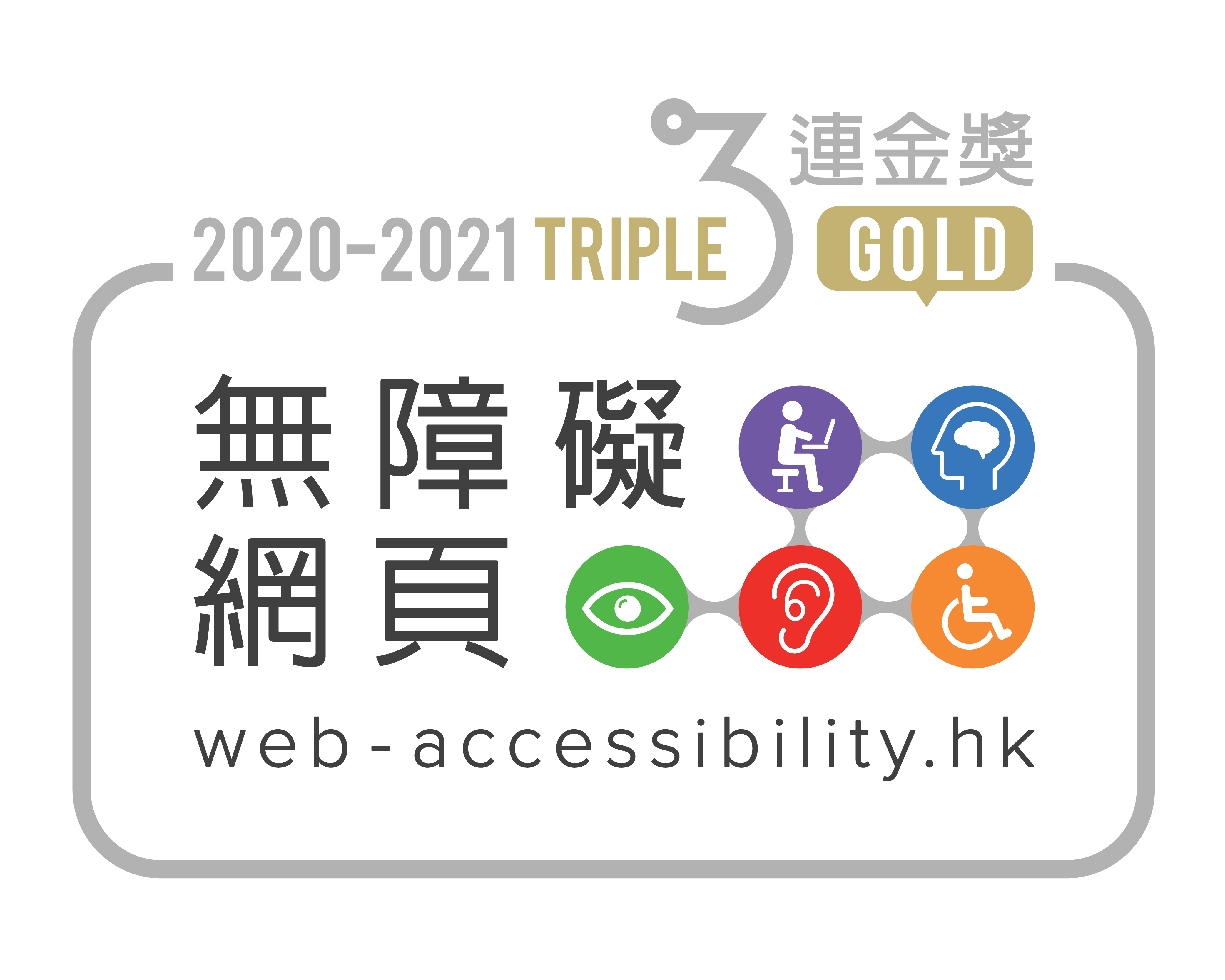Achievements
Can cancer patients be vaccinated?
Cancer is one of the major non-communicable diseases in Hong Kong. A total of 34,028 new cancer cases were diagnosed in Hong Kong in 2018, which was hitting a record high. On average, 93 people were diagnosed with cancer each day. Facing the uncertainty of the pandemic, the suitability of COVID-19 vaccination for cancer patients is one of the concerning issues now. Professor Tony Mok, Chairman of the Department of Clinical Oncology and Li Shu Fan Medical Foundation Professor of Clinical Oncology of the Faculty of Medicine at The Chinese University of Hong Kong, shares his thought with us.
———————
Q: Do cancer patients or survivors have a higher chance of being infected by COVID-19?
A: There is no evidence showing that these people have a higher chance of being infected by COVID-19. However, some of the cancer diseases and treatments can weaken a person’s immune system. Once patients catch the coronavirus, they might have a higher chance of developing severe COVID-19 related complications or be in more need of receiving intensive care than ordinary people. So, it will cause a higher death rate.
Compared to patients with solid tumours, blood cancer patients might have an even higher risk of catching COVID-19 and a higher death rate due to the fact that those patients do not have enough immunocytes to produce antibodies for fighting against the virus.
———————
Q: Can cancer patients or survivors receive COVID-19 vaccination? Which type of vaccines should they choose?
A: According to the guidance from the American Society of Clinical Oncology (ASCO) and European Society for Medical Oncology (ESMO), both cancer patients and survivors can be offered vaccination against COVID-19 unless there are certain special situations, such as having reduced immune responses or hematopoietic stem cell transplantation. Those patients are temporally not suitable to get vaccinated. They can be offered vaccination on full recovery. Therefore, there is only a small fraction of patients who cannot be vaccinated.
The American Cancer Society (ACS) also pointed out that people aged over 12 years old, including cancer patients, should get vaccination if there is no serious allergic history from prior vaccinations. Although there is no official guidance provided in Hong Kong, we always follow the European and American rules. The Hong Kong government also encourages cancer patients in remission to get vaccinated, while cancer patients in active treatments should discuss with their doctor on the timing.
Due to the rare number of cancer patient cases in the clinical experiments for COVID-19 vaccination, a universal result could not be drawn from current data. Therefore, I think that there is no limitation on the types of COVID-19 vaccines. If you were allergic to a previous dose of Comirnaty by BioNtech or its vaccine component, you should not receive Comirnaty. People who should not receive CoronaVac by Sinovac include people with a history of allergic reaction or severe allergic reaction to CoronaVac or other inactivated vaccines, people with severe neurological disease, an adverse reaction of the nervous system after a previous dose of CoronaVac, uncontrolled severe chronic disease, and those who are pregnant or breastfeeding.
———————
Q: Will there be any effect on the cancer treatment or vaccine efficacy if patients in active treatment receive COVID-19 vaccines?
A: Most cancer patients can receive vaccines except those with an abnormal number of white blood cells. Nevertheless, the physical condition of everyone is different, so you should consult your doctor before vaccination.
The National Comprehensive Cancer Network (NCCN) released a set of guidelines in March this year which explain to patients undergoing cancer treatment about taking COVID-19 vaccines, with relevant suggestions for different type of cancer patients.
Hematologic Malignancies: as known as blood cancer or lymphoma
If a patient is receiving intensive chemotherapy, vaccination is not recommended. For example, acute leukaemia patients who need to inject high-dose chemotherapy drugs on daily basis. It is because the number of white blood cells decreases during chemotherapy and weakens the immune system. This affects the function of the immune system and vaccine efficacy. Patients can only receive vaccines when the absolute neutrophil count (ANC) recovers.
Solid Tumor Malignancies: such as lung cancer, breast cancer, bowel cancer, liver cancer etc
Most patients who are receiving cytotoxic chemotherapy, targeted therapy, or radiation therapy are safe to receive COVID-19 vaccines.


